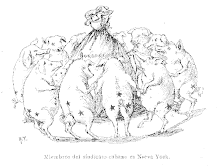Anyone who’s lived in Korea is familiar with the mad rush to get out of town on Chuseok and Seollal. They’ve seen the eerily empty streets and closed up shops in Seoul during those holidays. They’ve heard the stories of eating Dok-guk, of playing Yuk-nori, and of sitting in traffic for 10+ hours to cover a distance of 100km. But what happens on March First? How do Koreans—typically rabidly nationalistic—celebrate such a powerfully symbolic anniversary of Korea’s national birth? It seems as though they don’t do much. The rare Korean will put a flag out on their balcony or spend a few moments in solemn reflection on the memory Yu Gwan-sun. But most Koreans spend the day lounging about the house watching TV, sleeping in, and generally enjoying a day away from the office.
The absence of any strong tradition of celebration seems even more uncharacteristic when we consider how Koreans typically react over important symbols of Korean nationalism. Whether it’s in defense of Dok-do or in righteous indignation over a questionable judgment in the Olympics, Koreans tend to respond quickly and passionately. “You cheated, Apollo!” . . . “Go Home, Yankee!” . . . “독도 는 우리땅" . . . etc. So, what gives?
Well, I have a few ideas.
Well, I have a few ideas.
 For one, popularly, Koreans are reluctant to concede Korea’s relative newness. It’s more than just the colorful, bucolic imagery of the previous Korean dynasties that contribute to the unmatched popularity of movies like 왕의남자; there are practical reasons for insisting on 5000 years of Korean history, celebrating the stories of King Sejong, and encouraging Koreans to make pilgrimages to Gyeongju. There is a natural, and understandable, aversion to tracing the roots of modern Korea back to the early twentieth century. Why would Koreans want to lend even trace amounts of legitimacy to Japanese colonialism? In a related sense, this same aversion contributes to the reification of those Korean holidays that do have strong celebration traditions: Seollal, Chuseok, Buddha’s Birthday. What do all these holidays have in common? They all draw inspiration from traditions that pre-date Japanese colonialism.
For one, popularly, Koreans are reluctant to concede Korea’s relative newness. It’s more than just the colorful, bucolic imagery of the previous Korean dynasties that contribute to the unmatched popularity of movies like 왕의남자; there are practical reasons for insisting on 5000 years of Korean history, celebrating the stories of King Sejong, and encouraging Koreans to make pilgrimages to Gyeongju. There is a natural, and understandable, aversion to tracing the roots of modern Korea back to the early twentieth century. Why would Koreans want to lend even trace amounts of legitimacy to Japanese colonialism? In a related sense, this same aversion contributes to the reification of those Korean holidays that do have strong celebration traditions: Seollal, Chuseok, Buddha’s Birthday. What do all these holidays have in common? They all draw inspiration from traditions that pre-date Japanese colonialism. And it’s not just the Korean public that finds the convergence of Japanese colonialism and Korean nationalism difficult to reconcile; scholars have struggled with this as well. Only in Korea do historians use such strange tortuous terminology like “Colonial Modernity.” In other fields the apparent contradiction in this term is so absurd as to be laughable. Academia, in this regard, seems to reflect the discomfort Koreans feel toward their colonial past.
Secondly, the Korean established elite is uncomfortable with the surface-level imagery and symbolism of the March First Uprising. Quite understandably, a government that continues to struggle with the image of its own legitimacy might hesitate to celebrate too zealously a movement that so forcefully proclaimed the illegitimacy of the previous authority. This is most obvious during years when the commemoration of March First is decidedly more pronounced. As in most countries, the expression of Korean nationalism is most potent when directed toward external foes. In 2005, at the height of the most recent 독도 fervor, March First Movement celebrations were loud and organized. On that anniversary Roh Moo-hyun took the opportunity to excoriate Japan for not coming to terms, at least the way Korea would like it to, with its colonial past. This year, quite differently, the new president called for "national harmony to heal the economic wounds. In the absence of an identifiable "other" toward which Koreans can direct the passions of the uprising's remembrance, the rhetoric of the celebration is quite neutral.
I don't necessarily have an answer for this problem, if that's what it is. Koreans can celebrate or not celebrate their national holidays as they see fit. If on the off chance Koreans are ever looking for some traditional celebrations to institutionalize, however, I recommend hotdogs, hamburgers, a few Budweisers, and a little American football.











While I agree with your reasoning as to why Koreans might have an aversion to celebrating the day, I think the fact that after March 1st, 1919, Korea remained a Japanese colony for another 26 years has something to do with it as well. They might have declared independence, but their liberation wasn't until August 15th, 1945.
ReplyDeleteI think this post applies more to that day --another day oddly absent of celebration-- rather than Samil.
Also, Koreans don't usually celebrate individual people. Sejong only gets Hangul Day.
A very Korean answer; you’ve learned well, young Skywalker.
ReplyDeleteWhen asked about the lack of enthusiasm, Koreans tend to give a similar response. The implied rationale being that since the March 1st uprising was a “failure” it holds less significance. I’m afraid, however, that this reasoning simply doesn’t hold water. Consider the American case. The emergent United States of America declared independence in 1776, yet the war didn’t end until 1781 (prospects for victory were bleak until then) and the formal peace wasn’t signed until 1783. Does the seven years between the declaration of independence and the achievement of independence somehow negate the attempt? Well, not in the imagination of the American public. Who’s ever heard of “Treaty of Paris parades” or the “Spirit of ‘83?” We celebrate the date of the attempt; and we do it quite heartily I might add.
National holidays are funny things. They’re funnier still in situations like Korea’s and Germany’s, where the state is divided into two entities vying for legitimacy. During the nearly five decades of a divided Germany, each state celebrated the holidays they believed were part of their respective national stories. East Germany celebrated the Naval uprisings of 1917 as the beginnings of the “people’s revolution,” while the Bonn government all but ignored the events. Inversely, West Germany celebrated the attempted assassination of Hitler on the 20th of July (1944) as a way to separate the image of Germany from the image of Hitler. Yet the government in the East had difficulty working the celebration of the assassination into a reliable Marxist framework. It considered it just so much bourgeois fluff. I’m convinced that a similar issue is at the root of the official ambivalence toward the March First holiday in the South (I’m afraid I don’t know about the North).
You’re right, however, about King Sejong. They don’t necessarily have a holiday for him. But he is celebrated. Remember, it’s not Yi Seungman on the 10,000 note. Indeed, all three (soon to be four) persons represented on Korean bills are from the pre-Japanese period.
The American example works...and doesn't.
ReplyDeleteIt works because --as you said-- America celebrates the attempt. Still, it doesn't address the fact that there isn't a national holiday celebrating the actual date independence was achieved. Korea does (even though it was a little anti-climatic in the sense that Japan left on their own). So, America celebrates the attempt and Korea recognizes both, but celebrates neither.
On a side note, I made a joke about Sejong having an erection to my class the other day. I think the punch was something along the lines as "why do you think he's always sitting down."
They did not like it at all. Giving ol' Sej' some sexuality was not warmly welcomed.